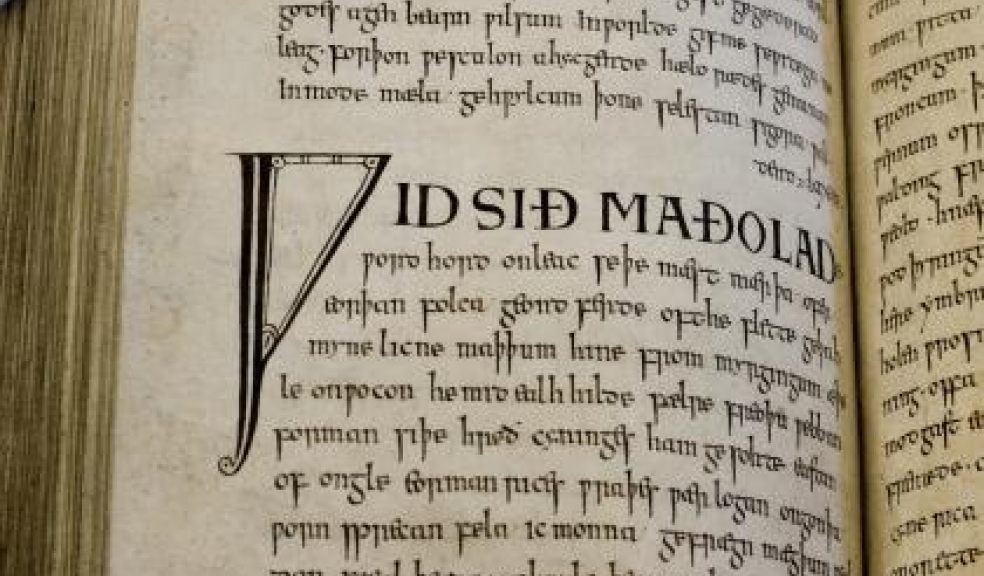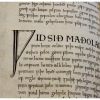
Exeter Book granted UNESCO status
The Exeter Book, one of Exeter Cathedral’s greatest treasures, has been granted UNESCO Memory of the World status, signalling its ‘outstanding significance’ to British and world history.
The award will be presented tonight at the Senedd, the National Assembly building for Wales, in Cardiff.
The Exeter Book joins only 50 other documents on the UK register listing important historical documents.
Professor Emma Cayley, Associate Professor of Medieval Literature at the University of Exeter, said: “This recognition now puts the Exeter Book in the same category as the Magna Carta, the Bayeux Tapestry, the Book of Kells and the Diary of Anne Frank in terms of its significance. It is so important that the book remains here in Exeter, where it has been housed for almost a millennium.”
UNESCO established the Memory of the World (MoW) Programme in 1992. The programme vision is that the world's documentary heritage should be preserved and access to it widened to the general public. The UK Register recognises documentary heritage deemed by a panel of experts to be of outstanding significance to theUK.
The Exeter Book is an anthology of poetry in Old English, written down around 970 AD, and is one of only four surviving major poetic manuscripts in Old English. It is the largest collection now in existence.
The UNESCO citation describes the Book as the “the foundation volume of English literature, one of the world’s principal cultural artefacts”.
Kept in the Cathedral’s own library the book has been at the Cathedral since the mid 11th century. It was the gift of Exeter’s first bishop, Leofric (d.1072) and contains some 40 poems of different lengths, of different types and ages. Significantly it also includes nearly 100 poetic riddles which are virtually all that survive in Old English.
Cathedral Librarian Peter Thomas said: “There are many treasures in Exeter Cathedral Library and Archives, but as Cathedral Librarian for many years I have always known that the 10thcentury Exeter Book of Old English Poetry is the most remarkable of them all. Poetic manuscripts in Old English (Anglo-Saxon) are extremely rare – only four survive in the world – and the Exeter Book is the most varied, the best preserved and probably the oldest of them.
“The book was presented by Exeter’s first bishop and has been kept at the cathedral since at least the 11th century but its importance is worldwide. It is the foundation volume not only of the Cathedral Library but also arguably of English literature itself, one of the major contributions to world culture. The global significance of the manuscript has now been recognised by the UK National Commission for UNESCO, who have included it in the UK Memory of the World Register, a catalogue drawn up for the protection and promotion of our documentary heritage. As a member of the Cathedral & Archives team I feel very gratified to have played a part in achieving such recognition for this unique manuscript.”
Exeter Cathedral’s Canon Librarian, Ann Barwood, said: “It is interesting to note that it was not until the 19th century that the Exeter Book began to receive the attention it had deserved for centuries. I hope that this new award will help more people to learn of its importance to English literature and culture.”
The Dean of Exeter Cathedral, Very Rev Jonathan Draper, said: “We are immensely proud and honoured to house the Exeter Book in Exeter Cathedral. It is wonderful that its huge importance to English literature and history has been recognised by UNESCO in this way.”
Prof Cayley, in partnership with academics at Stanford University in the States, is developing an app of the Exeter Book to open it up further for scholars and the general public, and particularly school children and students, around the world.
Other documents to be celebrated and honoured at tonight’s award ceremony in Cardiff include the medieval archives of Canterbury Cathedral and the laboratory notebooks of the scientist Michael Faraday.
Elizabeth Oxborrow-Cowan, Chair of the Memory of the World UK Committee said: “These remarkable documents showcase the incredibly rich documentary heritage of theUK, much of which is freely available to the public through archives, museums and libraries. I encourage people to discover this inheritance for themselves.”
Exeter Cathedral’s Library and Archives were substantially refurbished in 2011, to provide environmentally controlled storage for the library and archive collections. Regular open afternoons for visitors to see and learn more about the Exeter Book are held at the the Cathedrals Library Archives. The next open afternoon will be on 6 July and more details are available in our What's On listings.













